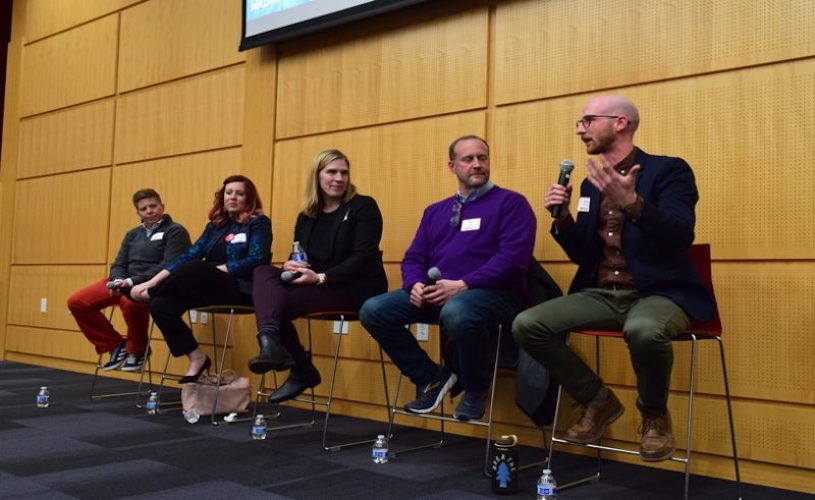at the University of Utah
Panel shares tips on working with empathy at LGBTQ+ event
How do employers create an environment that allows employees to bring their whole and best selves to work?
Several members from the LGBTQ+ business community shared their ideas for working with empathy at a recent panel sponsored by the Out for Business club and Alumni Relations at the David Eccles School of Business. The panelists were:
- Derek Kitchen, Utah State Senator for District 2 and owner of a Middle Eastern food business;
- Billy Stern, consultant and former general counsel at Ancestry.com and Martha Stewart OmniMedia;
- Kim Mains, Vice President of Product and Operations at Vivint Smart Home;
- Ariel Malan, Transgender Health Program Coordinator at the University of Utah School of Medicine; and
- Kim Hackford-Peer, Associate Chair and Associate Professor of Gender Studies at the University of Utah.
Here are some of their top takeaways to creating a workplace that exudes empathy.
Tell Your Story
Storytelling is important to Kitchen in his business, which hires a large number of refugees through the International Rescue Committee. Kitchen shares his story, and encourages his employees to share theirs, to help create a sense of community and show that they have more similarities than differences.
Figure Out Who You Are Dealing With
“There are open-minded jerks and closed-minded polite people,” Stern joked. It’s important to know who you are dealing with and not make assumptions about who will be empathetic to your cause. Stern recalled an incident at Ancestry.com, a Utah County company with a large LDS population, where he pointed out that family trees always feature a mother and father, instead of same-sex couples. Stern expected his comment to be shocking, but instead his coworkers rallied around the idea and were enthusiastic about making the change.
Allow Employees to Be Their Whole Selves
Hackford-Peer recalled her time early in her career as a high school math teacher. She wasn’t allowed to be out to her students, and it got to the point where she just couldn’t do it anymore. “I had to find a way to be a teacher where I could be my whole self, all the time.”
Notice Your Own Privilege
We all have our own level of privilege based on various factors. It’s important to recognize those aspects and use them to become better at intersectionality. Mains recalled a time attending a Women in Tech luncheon where many women expressed guilt over putting their careers before those of their husbands. Mains, married to another woman, had never noticed that societal cloud that hangs over many of the other women in similar positions at different companies. “It showed me how I need to do a better job of intersectionality and how I can be a more empathetic leader,” Mains told the audience.
Defy the Gender Binary
Without noticing it, the business world often tends to fall into practices that enforce the idea of binary gender, Malan pointed out. Small things like adding pronouns to emails or revamping the dress code to be more inclusive of those who don’t present as traditionally masculine or feminine can go a long way to making people feel more comfortable. Particularly for the trans population, these small changes can have a huge impact.
Small Gestures Go a Long Way
All the panelists agreed that it is often small and meaningful acts of empathy that helped them feel most seen and included. Hackford-Peer shared a memory of talking with several of her wife’s coworkers prior to a big gala they would all be attending together. One of the coworkers casually mentioned to Hackford-Peer that they would be happy to hook her up with a place to get a tux. It was a tiny thing, said in a completely casual way, but it went far in helping the couple feel accepted and a normal part of the group.
Don’t Be Afraid to Take Up Space
“Part of being queer is trying to speak yourself into an existence that you didn’t know was possible,” Hackford-Peer told attendees in conclusion. Kitchen agreed. “Just keep engaging the way that you are,” he said. “Don’t be afraid to take up space.”





